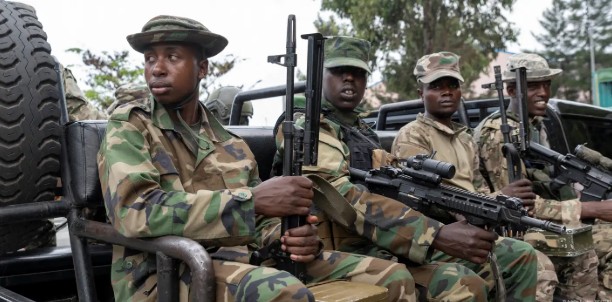M23 Rebel Parade Raises Fears Over Eastern Congo Peace Deal as Tensions With Rwanda Persist

A massive military parade held by the M23 rebel group in eastern Congo over the weekend has triggered fresh fears that a long anticipated peace deal between the Democratic Republic of Congo and Rwanda the group’s alleged main backer could be unraveling.
On Sunday, M23 fighters staged a show of force in Goma, parading more than 7,000 new recruits, including what they claimed were former Congolese army soldiers and local militia members who had surrendered or joined their ranks. The rebels marched through the regional capital under the watch of commanders and regional observers.
The parade took place just weeks ahead of a U.S.-brokered peace agreement expected to be signed in Washington, raising concerns about the group’s true commitment to the negotiations.
Peace Deal Under Threat
The peace framework mediated by Qatar and backed by the United States is expected to call for the withdrawal of Rwandan support for M23, the return of occupied territories to Congolese authorities, and a commitment by both parties to halt hostilities. However, continued skirmishes in rebel-held areas and actions like Sunday’s parade suggest the situation remains volatile.
A United Nations panel of experts has stated that the M23 is heavily backed by Rwanda, with thousands of Rwandan troops reportedly operating in eastern Congo. Kigali has consistently denied these claims, but the accusations have contributed to growing international pressure on Rwandan President Paul Kagame.
Humanitarian Crisis Deepens
The conflict in North Kivu and South Kivu provinces has resulted in over 3,000 deaths and the displacement of millions. The United Nations Human Rights Office released a report earlier this month documenting “horrific atrocities” committed by both the M23 rebels and the Congolese armed forces.
The report highlights crimes such as:
Gang rape and sexual slavery
Torture and extrajudicial killings
Forced recruitment of child soldiers
Systematic attacks on civilians
“These abuses are not one-sided. Responsibility lies with both the M23 and Congolese forces,” the UN report stated, further implicating Rwanda as complicit through its support of the rebels.
Rights groups, including Amnesty International, say they have documented forced recruitment in rebel held zones, particularly of young residents and surrendered soldiers.
A Fragile Path to Peace
The Qatar-led mediation had earlier shown signs of progress, with both sides committing to a ceasefire and agreeing to the framework of a negotiated settlement. But with ongoing violations of the ceasefire, rising tensions, and provocative shows of military power, analysts warn the window for a peaceful resolution may be closing.
As the eyes of the international community turn to Washington, where final negotiations are expected to take place, many in eastern Congo remain skeptical.
“People here want peace not parades,” said a resident in Goma who asked not to be named. “This is just a reminder that we’re still living under fear, no matter what the politicians say.”
